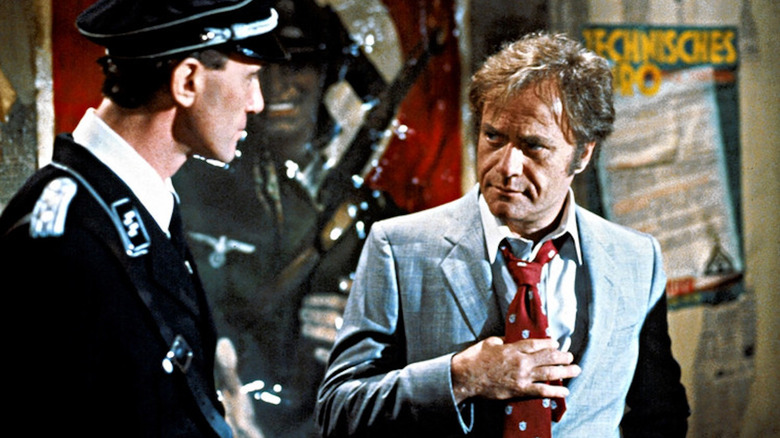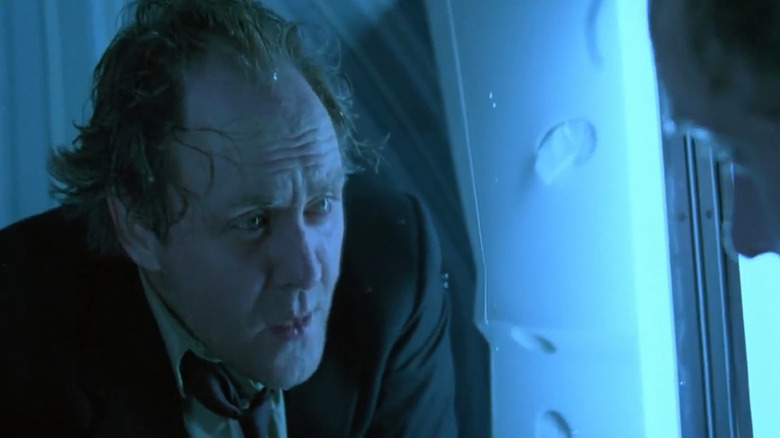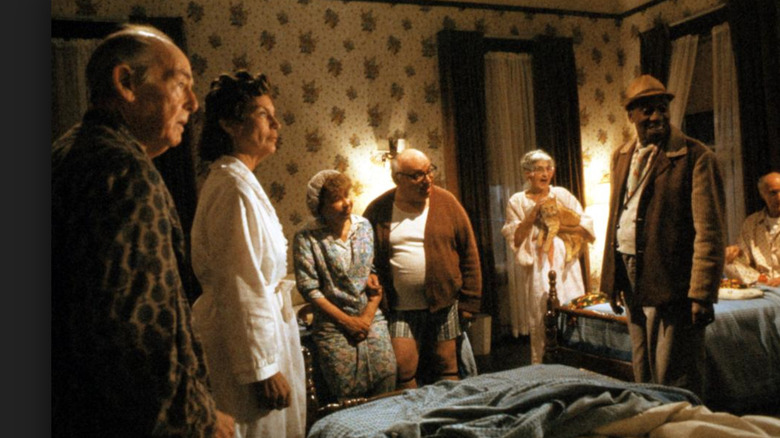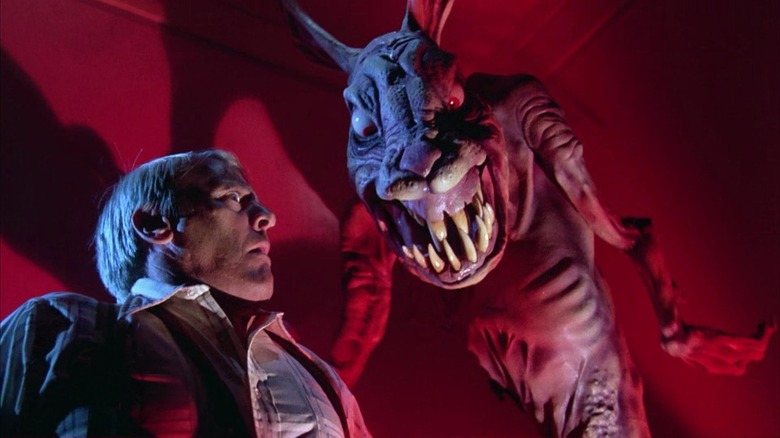Here's What The Worst Critic Reviews Said About Twilight Zone: The Movie
Few films have arrived in theaters saddled with more baggage than "Twilight Zone: The Movie." That the anthology film featuring segments from John Landis, Steven Spielberg, Joe Dante, and George Miller actually arrived in the first place was something of a surprise — and for many in the entertainment industry, it wasn't a welcome one.
The production became a wholly avoidable tragedy on June 23, 1982, when a helicopter crashed on the set of Landis' segment, "Time Out," killing Vic Morrow and child actors Myca Dinh Le and Renee Shin-Yi Chen. The show does not always have to go on, but the movie was nevertheless completed and released (rather insensitively) on June 24, 1983, leading off with "Time Out" (which felt at the time like a shamefaced, let's-get-this-out-of-the-way gesture). For some, it was like watching a snuff film.
How do you not let the realization that you're watching what might be a criminal production — the National Transportation Safety Board had yet to finish their investigation, which would lead to Landis being tried and acquitted on charges of manslaughter four years later — impact your viewing experience? Can you in good conscience set this possibility aside and judge the film on its own merits?
This was the challenge before film critics in 1983, and they mostly managed to look past the tragedy in their reviews. This left them with a four-part paean (with a creepy-funny prologue starring Dan Aykroyd and Albert Brooks) to Rod Serling's classic television show crafted by two of the most successful directors of their era and two relative newcomers. Given this pedigree and its summer berth, "Twlight Zone: The Movie" was undoubtedly an event film. So where did critics land on the movie?
The new kids outclass the star directors
The reviews were surprisingly uniform in declaring "Twilight Zone: The Movie" a mixed bag. Most agreed that Miller's adaptation of Richard Matheson's "Nightmare at 20,000 Feet," starring John Lithgow as a nervous airline passenger who's convinced a gremlin is tearing up the wing of his plane, was by far the best in show.
The Chicago Sun-Times' Roger Ebert praised Miller's short as "some kind of manic classic." The New Yorker's Pauline Kael was also dazzled, writing:
"[W]ith the Australian George Miller (the director of 'The Road Warrior') in charge and John Lithgow as star, the result is a classic shocker of the short form — something that ranks with the Alberto Cavalcanti segment of 'Dead of Night,' the one with Michael Redgrave as the ventriloquist."
If you've never seen "Dead of Night," trust me when I say this is very high praise.
They were also impressed to varying degrees with Dante's darkly comedic take on "It's a Good Life," though some felt it didn't fully deliver on its unnerving promise. Ebert dug it, but according to The New York Times' Vincent Canby, "Joe Dante, the director, never finds a style for the piece, which should somehow combine the comic, the scary and the satirical."
As for Landis' "Time Out" (the only original story of the group) and Spielberg's "Kick the Can," the consensus was that they pretty much stunk.
Kicking Spielberg's 'Can' to the curb
Canby ripped into Spielberg's segment (which features Scatman Crothers as a newly arrived nursing home resident who magically transforms his elderly housemates into children), calling it an "ugly, sentimental comedy." Kael went even further, labeling the short an "embarrassment." She summed up her distaste with these two withering sentences:
"With the gloppy rich music, and what might be (laughingly) described as the ensemble acting, the tone here is sentimental-comic, and horribly slick. It's as if Steven Spielberg had sat down and thought out what he could do that would make his detractors happiest."
This was quite the kick in the junk following Spielberg's rapturously received 1982 duo of "E.T. the Extra-Terrestrial" and "Poltergeist."
Landis' segment was deemed, at best, a misfire that lacked a twist. Kael speculated that Morrow's unabashedly bigoted protagonist, who gets flung back in time to experience what it's like to be the target of racial hatred, was supposed to have a redemptive arc. "[T]here's no shading in it," she complained. "That probably would've come with the twist." Ebert concurred, writing, "This segment is predictable, once we know the premise, and Landis does nothing to surprise us."
Two out of four is a good day in baseball, but evidently not good enough for movies
You'd think an anthology film that closes with Miller's masterfully directed corker might eke out an overall passing grade, but Ebert, whose review was one of the most enthusiastic at the time, could only muster up two stars for the entire endeavor. Less charitable reviewers thought the film simply paled in comparison to its brilliant inspiration. Per Ed Siegel of the Boston Globe:
"'Twilight Zone: The Movie' fails because it tries to blend the spirit of the TV show into a medium whose spirit has evolved away from subtle storytelling. The result is like trying to merge a Wagner opera with a Debussy sonata."
When the film hit the home entertainment window, its reputation gradually improved — primarily because you could truncate the experience by fast-forwarding from the stellar opening to Dante's segment. There's somewhere around 70 minutes of damn good filmmaking in "Twilight Zone: The Movie," and, these days, that's enough.



